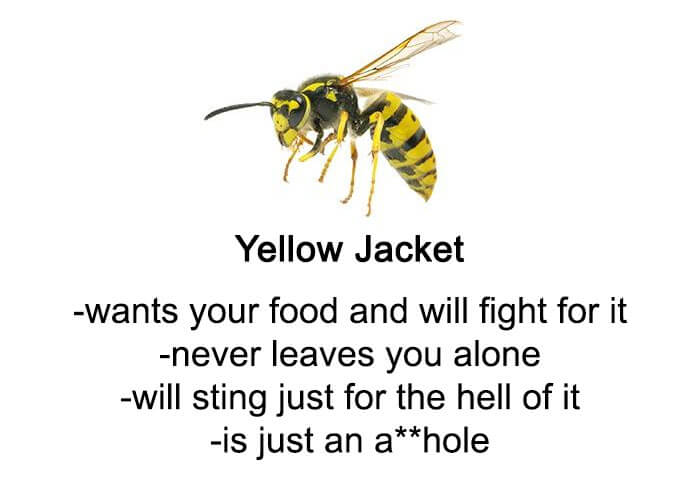Yellow jacket hornet removal
Your backyard1 can be home to an aggressive menace - the yellow jacket hornet . They prey on a ton of other, more annoying insects. Generally, they’re not a problem. Should you have the misfortune of having them nest in the ground in your pastures or lawn, they’ll waste no time reminding you it’s their world and you just live in it.
Nests inside buildings should be attended to by a professional. They have access to really neat chemicals that kill bugs and not people. Easily accessible nests can be killed with the long range bug spray in a can. It’s not practical to have pros treat lawns and pastures where they’re in the ground, which is where I’ve always had the misfortune of encountering them. Insecticide dust, drowning with water from a hose, and other common means aren’t always the most effective given the depth they can nest to either.
Sometimes, they simply have to be relocated gently. To the afterlife. With fire. 🔥
 this guy and his million buddies do not want peace
this guy and his million buddies do not want peace
If you’re not under a burn ban, fire is remarkably effective at removing them. Wait until dusk and watch where they fly. They’ll return to their nest in the evening and are usually less aggressive. Mark their entry hole with a stone or stick or something. Come back in an hour or two, after the sun has set. If you need a flashlight, try to put some red/pink film over it as light makes them wake back up.
Take about half a gallon of gasoline2, a bucket full of water (for safety), and a lighter out with you. Pour the gasoline into the hole, then make a small trail of gas on the ground extending back about a yard. Repeat if you’ve marked multiple entrances/exits within the same nest. You will not be drowning them with fuel, so don’t worry if you don’t see anything come back up. Light the end of the fuel trail(s).
It shouldn’t flare up much if you extended that trail of fuel back enough. The gasoline vapors will burn, asphyxiating the hornets inside. You may see a couple come out on fire but likely not more than a few. Enjoy it.
Camp rules apply here too - don’t leave the fire unattended. It usually takes half an hour or so to burn off in my experience. Dump the water down the hole once you’re done.3
Repeat if needed each night until they’re fully gone. I’ve never had to treat a nest more than twice, but YMMV.
Once they’re gone, make sure your trash cans close fully, garage/barn areas are cleaned of things they eat (basically everything), and brush piles are tidy. Keep lawns/pastures/fences mowed and they should find other places more attractive to nest next year.
-
across North America and Europe, anyways … possibly more? ↩
-
I’ve always used gasoline or two-stroke engine fuel, usually whatever was left in cans over winter because that may have some water in it. I’d bet diesel works too, but with less vapors to burn off. ↩
-
I’ll tell you “just in case it lights back up” and that’s a scary possibility. It’s equally true that a 5 gallon bucket of water is 40-45 pounds, which is heavier than I ever care to carry back. ↩